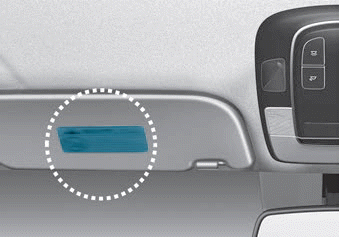Hyundai Palisade: Automatic Transaxle Control System / Speed Sensor
Specifications
▷Type : Hall effect sensor
Item
|
Specification
|
Operating condition (°C)°F
|
(-40 to 150) -40 to 302
|
Output voltage (V)
|
High
|
1.18 - 1.68
|
Low
|
0.59 - 0.84
|
Components and components location

1. Input speed sensor
2. Output speed sensor
|
3. Middle speed sensor
|
Schematic diagrams

Repair procedures
| • |
Refer to the DTC manual for the check procedure.
|
|
| • |
When the solenoid valve Diagnostic Trouble Codes (DTC) is on,
perform the following procedure to replace it.
|
| • |
Automatic transaxle is composed of delicate components. Be careful
not to cause any damage on the component in the course of assembly
and disassembly.
|
| • |
Maintain clean condition so that foreign substance does not
get into the automatic transaxle.
|
| • |
Use a coated apron, latex gloves, and stainless tray to prevent
foreign substance from getting into the transaxle.
|
| • |
Automatic transaxle fluid (ATF) can be reused. Collect it using
a clean 10-liter beaker.
|
|
| 1. |
Turn ignition switch OFF and disconnect the negative (-) battery cable.
|
| 2. |
Remove the battery and battery tray.
(Refer to Engine Electrical System - "Battery")
|
| 3. |
Remove the air duct and air cleaner assembly.
(Refer to Engine Mechanical System - "Air Cleaner")
|
| 4. |
Remove the under cover.
(Refer to Engine Mechanical System - "Engine Room Under Cover")
|
| 5. |
Drain the coolant.(If equipped ATF warmer)
(Refer to Engine Mechanical System - "Coolant")
|
| 6. |
Loosen the drain plug (A) and reinstall the drain plug after draining
ATF totally.
|
Tightening torque :
33.3 - 43.1 N.m (3.4 - 4.4 kgf.m, 24.6 - 31.8 lb-ft)
|

| •
|
Replace the gasket before reinstalling the drain plug.
|
|
|
| 7. |
Loosen the fixing bolt (A) and then removing the bracket.
|
Tightening torque :
9.8 - 11.8 N.m (1.0 - 1.2 kgf.m, 7.2 - 8.7 lb-ft)
|

|
| 8. |
Loosen the fixing bolts (A) and then removing the bracket.
|
Tightening torque :
9.8 - 11.8 N.m (1.0 - 1.2 kgf.m, 7.2 - 8.7 lb-ft)
|

|
| 9. |
Separate the ATF cooler hose (A).

| •
|
Carefully install the clamp not to damage the hose.
|
| •
|
Install the clamp in a correct direction not to be interfered
with other parts.
|
| •
|
After the installation, start the engine and then check
if there are any leakages from the hose.
|
|
|
| 10. |
Loosen the upper bolts (A) of the valve body cover.
|
Tightening torque :
11.8 - 13.7 N.m (1.2 - 1.4 kgf.m, 8.7 - 10.1 lb-ft)
|

|
| 11. |
Remove the valve body cover (A) after removing the bolts.
|
Tightening torque :
11.8 - 13.7 N.m (1.2 - 1.4 kgf.m, 8.7 - 10.1 lb-ft)
|
| •
|
Be careful when removing the valve body cover because
the remaining ATF remains in the valve body cover.
|
|

| •
|
Replace the gasket (A) before reinstalling the valve
body cover.
|
| •
|
After the installation, start the engine and then check
if there are any leakages from the valve body cover.

|
|
|
| 12. |
Loosen the bolts and then Separate the main harness (A).
|
Tightening torque :
9.8 - 11.8 N.m (1.0 - 1.2 kgf·m, 7.2 - 8.7 lb-ft)
|

|
| 13. |
Remove the valve body assembly (A).
|
Tightening torque :
(A) 9.8 - 11.8 N.m (1.0 - 1.2 kgf·m, 7.2 - 8.7 lb-ft)
|

| •
|
Attach the manual pin (B) to the detent lever (A) and
assemble the valve body.

|
|
|
| 14. |
Disconnect the speed sensor connector (A).

|
| 15. |
Loosen the bolts and then removing the speed sensor (A).
|
Tightening torque :
9.8 - 11.8 N.m (1.0 - 1.2 kgf·m, 7.2 - 8.7 lb-ft)
|


|
| 1. |
To install, reverse the removal procedure.
|
| 2. |
Inject the automatic transaxle oil and inspect the oil level.
(Refer to Automatic Transaxle System - "Automatic Transaxle Fluid")
| •
|
After ATF level check or exchange, be sure to remove
residual ATF on transaxle case.
(Be especially sure to remove residual ATF between automatic
transaxle case and valve body cover)
|
|
|
Specifications
Specification
▷ Type: Negative Thermal Coefficient Type
Temp [(°C)°F]
Resistance (kΩ)
(-40) -40
48...
Specifications
Specification
Item
Specification
Power supply (V)
4.5 - 5.5V
Output type
Shifting range
Non-contact (2 channel PWM signal)
Description and operation
Description
Output position signal(P,R,N,D) by the actuator operation to the controller
(SBW Control Unit_SCU)...
Other information:
Components and components location
Component Location
1. Radiator grill
Repair procedures
Replacement
•
When removing with a flat-tip screwdriver or remover, wrap protective
tape around the tools to prevent damage to components...
The TPMS Malfunction Indicator will
illuminate after it blinks for approximately
one minute when there is a
problem with the Tire Pressure
Monitoring System.
Have the system checked by an
authorized HYUNDAI dealer as soon
as possible.
NOTICE
If there is a malfunction with the
TPMS, the individual tire pressures
in the cluster LCD display
will not be available...
Categories

Air bag warning labels, required by
the U.S. National Highway Traffic
Safety Administration (NHTSA), are
attached to alert the driver and passengers
of potential risks of the air
bag system. Be sure to read all of the
information about the air bags that
are installed on your vehicle in this
Owners Manual.
read more


 Oil Temperature Sensor (Main Harness)
Oil Temperature Sensor (Main Harness) Position Sensor
Position Sensor





















